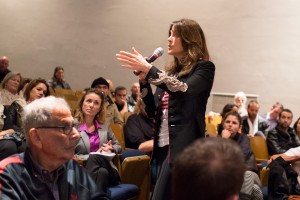Marianne Williamson runs for Congress in LA
Spiritual teacher, author and lecturer Marianne Williamson is running for Congress in California’s 33rd District.

Campaign trail · Congressional Candidate Marianne Williamson speaks and answers questions to potential voters while campaigning. – Photo courtesy of Ileana Wachtel
Williamson is running as an independent, a stance she believes is necessary to change the national political dialogue. She faces the incumbent democratic candidate Henry Waxman who has represented the general district for more than thirty years.
Politics is a new field for Williamson. Though some might believe there is a gap between the spiritual and political worlds, Williamson disagrees and has based her campaign on the same principles.
“I think the fact that people do see politics as separate from our lives is part of the problem in America,” Williamson said. “The fact that politics has become a spectator sport and that there’s only a certain group that is deemed ‘political types’ is dangerous.”
Williamson began her career as a lecturer. The best-selling author is taking ideals of self-transformation and using them to tackle issues such as food corruption due to high-fructose corn syrup and processed foods, climate change and the United States’ reliance on fossil fuels.
She also hopes to close the gap between the “haves” and the “have-nots.”
Williamson believes that the tools individuals use to change their lives can be applied to larger groups — such as the United States. Her campaign hopes to bring attention to a dialogue that is rarely heard in full.
In 1997, Williamson published The Healing of America, which discussed a holistic perspective on the United States’ political system. She encourages citizens to “reclaim their spiritual voices” in all aspects of their lives, especially politics.
Similar principles outlined in the book are the ones upon which Williamson said she will challenge Waxman. Williamson plans to decline all funds provided by special interest groups and instead focus on the issues of the people.
“To me, politics should be a container for a deep national conversation,” Williamson said. “Whereas at present, politics is the purveyor of the most shallow conversation possible, and looking to the political status quo to change this seems absurd given that the political status quo brought us to where we are.”
David Moreno, a sophomore majoring in international relations and political science, sees the spiritual aspect of politics to be a competitive edge for Williamson.
“To be honest and successful in politics requires individuals to shut out the interest groups and listen to what’s right by the people — and themselves. I think it’s unique to say it aloud, but not a new idea.”
Williamson hopes to promise graduates the ability to create their own jobs, careers and fields.
Referencing Oregon as an example of an educational system that provides free higher education, she is working to get funding out of politics and into educational opportunities.
“Higher education is becoming more and more a luxury of a small group who can afford it. This is as un-American -— as undemocratic — as you can get,” she said.
Students on campus recognized the power of scholarship and the need for a university education.
“Although it may seem more as a luxury due to college sports, location and connections, higher education is still expected for students and will continue to be that in the future,” said Ashley Warner, a senior majoring in communication.
Kevin Keer, a sophomore majoring in computer science and physics, disagreed.
“Many universities such as USC have programs that help underprivileged students achieve the goal of reaching college. Cost is normally a deterrent from certain schools but sometimes it attracts other students to some other schools.”
Williamson provided the following advice for students seeking success.
“I think that if [the government] does right by [students] that when you get out of college, you can create your own six-million dollar company if you want to. [the United States should] give you the tools and then watch you run.”
